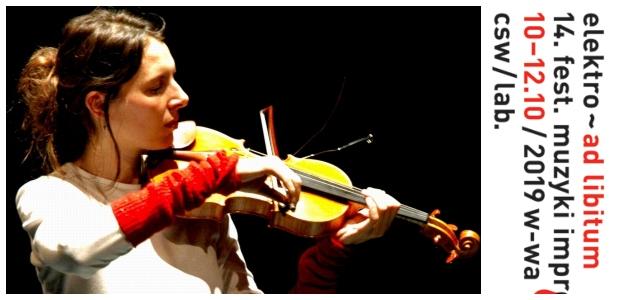Tiziana Bertoncini: “Silence is the condition to which all art should aspire”

Tiziana Bertoncini is an Italian violinist and painter. She told me about her move to Vienna, her attitude to classical music and her cooperation with Thomas Lehn. She didn’t tell me what they will perform on Ad Libitum Festival, but as Tiziana said: the best is not knowing what to expect.
Violin is often used in orchestras and classical chamber music. Have you got some experience in that field?
Yes, I studied classical violin and played also in orchestras. At that time I felt narrow in that environment and needed to find a more personal way of expression. (I didn't have the same feeling with chamber music (especially string quartet) though.)
I was very interested in extended techniques and to discover unusual sounds on the violin.
Nevertheless, the classical studies were essential for me and still my daily training is based on practicing and playing classical music. There is so much to discover in one piece!
With Thomas we also like to play classical pieces for violin and piano: Bach, Beethoven, Brahms sonatas and so on. So, this music is always present.
You’re from Italy, but you live in Vienna. Why did you decide to move? I read the ranking of the happiest cities in Europe, and Vienna was in the top ten. Do you agree?
I wanted to move out of Italy, because there is no support for the arts. Why Vienna...actually, I think it was because of its lively arts scene and the “mitteleuropean” atmosphere. It's also very close to Bratislava (where my mother was from) and Italy is not far.
Vienna is a special capital, in the sense that one doesn't always have the feeling to be in a city: the rhythm is not so frenetic and there are a lot of “small villages” within (in all senses). This is an advantage and at the same time its limit.
Is there improvised music popular? How people react on your performances?
In Vienna there is a scene for improvised music, in other words it has its musicians, venues and audience. It is an established scene, existing since many years.
Usually the people are excited, but of course, it is always thrilling to play in front of audiences who are not experienced with this music.
You will come at Ad Libitum Festival with your project with Thomas Lehn. What can we expect after this performance?
The best is not knowing what to expect.
How your cooperation with Thomas begun? What did you gain from him?
Our collaboration started in 2002, actually our first concert was in 2001. Our music changed a lot since that time. I learned to accept the differences of our instruments, the different characteristics of the sounds, and possibilities of articulations. I feel very free when we play together now, because each of us can be autonomous and at the same time with the other.
You also have done some outdoor installations, like “Sinfonia Invisible” in forest, by your own. It seems to be very interesting project. Tell me about it.
In “Sinfonia Invisibile” the tubes are acting like a filter of the environmental sound transforming it into a “whispered” pitch, a note. It's what usually happens when we blow in a tube. In this case it happens by a constant sound (wind, water flowing, could be also car traffic). By putting the ears next to two different tubes, we hear a musical interval and through every distinct interval the perception of the environment changes. The “voice” of the tubes is very special and beautiful and each person is creating her/his personal Symphony in total intimacy.
The conditions are simple: a space where the tubes can be hanged and where there is a constant environmental sound.
I don't have plans to come to Poland with this installation, but I would be happy to do so, of course.
Walter Pater said "all art constantly aspires to the condition of music". What do you think about this sentence, as a painter and musician? Does music is really the finest art? Does music has some privileges, comparing to other arts?
That's a difficult question. Definitely we can't generalize. Music includes a a lot of genres. So, which music was Pater meaning?
In any case in our world today listening is definitely the forgotten sense. We are in the age of seeing and everything is appearance.
(Pop) music is everywhere and it became a filler against silence, a constant background, that no one is listening anymore.
I would say that nowadays silence is the condition to which all art should aspire.
Silence as the alpha and omega from which we can restore our listening to the world, to the others and to the music itself.
- Aby wysyłać odpowiedzi, należy się zalogować.







